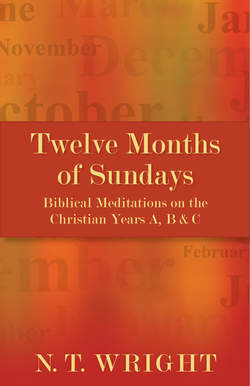Читать книгу Twelve Months of Sundays - N.T. Wright - Страница 38
На сайте Литреса книга снята с продажи.
ОглавлениеThe Fourth Sunday of Easter
Acts 2.42–47
1 Peter 2.19–25
John 10.1–10
A student of mine spent a long vacation working with local churches in central Africa. Next term, the College Head asked him, in my presence, what he wanted to do with his degree. ‘Work in third world development,’ he replied. ‘Then why’, asked the Provost, an economist himself, ‘aren’t you reading Politics and Economics?’ The student didn’t even blink. ‘Because Theology is so much more relevant,’ he shot back.
Read Acts 2 and see why. Jesus had launched the new-covenant movement. His followers, like the Qumran community, believed that they, the renewed Israel, should live as a family. They belonged to each other, as brothers and sisters; and close families, in that culture at least, shared a purse. (This, by the way, is why it’s so misleading when non-sexist translations render ‘brothers’ as ‘friends’ and the like. Why not ‘family’?) If God had now acted to bring forgiveness at every level, how could they not forgive debts as they had been forgiven?
The so-called primitive communism of the early Church had little to do, then, with a belief that the world was coming to an end, and a great deal to do with the sense of fulfilment: the world of debt, the world of injustice, had come to an end on Calvary, and they were modelling the new world of forgiveness. They weren’t so concerned with the last days of the old world as with the first days of the new one. Politicians and economists can’t sort out third world debt, but the gospel, and its message of Jubilee, just might. If ‘teaching, fellowship, bread-breaking, prayers’, let alone ‘theology’ (remember Harold Wilson and ‘the theology of the Common Market’?) sounds boring to some, maybe it’s because we’ve forgotten that each of the four aspects of the early Church’s daily life stood the world’s values, not least its systemic injustices, on their head.
Abundant life, then: that’s what Jesus has on offer, not the thin, hang-on-like-grim-death approach that you find in some churches. The ‘shepherd’ parable in John 10, which really continues to v. 30, explores the intimate relation between shepherd and sheep, with the emphasis on the shepherd’s desire that the sheep be led in the right direction, fed and watered, and kept secure for ever. And the point throughout is that Jesus is contrasted with other would-be Messiahs: thieves and brigands, he calls them. There were plenty of those in Jesus’ world, leaders of marauding gangs on the one hand and ‘holy brigands’ (fundamentalist terrorists, we would call them) on the other. Jesus’ way of leadership, of founding the new movement, was totally different, and totally relevant to his day and ours. A different style, an upside-down ambition, a self-giving love that, as Peter saw, would then be imitated by his followers – the world waits to see what can happen when wandering sheep, brought home by the Shepherd’s love, then start to live by the same pattern.
